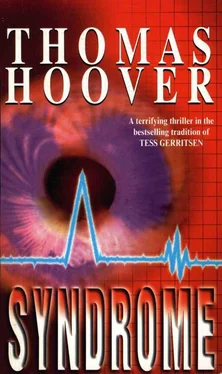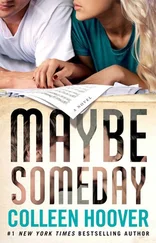Thomas Hoover - Syndrome
Здесь есть возможность читать онлайн «Thomas Hoover - Syndrome» весь текст электронной книги совершенно бесплатно (целиком полную версию без сокращений). В некоторых случаях можно слушать аудио, скачать через торрент в формате fb2 и присутствует краткое содержание. Жанр: Триллер, на английском языке. Описание произведения, (предисловие) а так же отзывы посетителей доступны на портале библиотеки ЛибКат.
- Название:Syndrome
- Автор:
- Жанр:
- Год:неизвестен
- ISBN:нет данных
- Рейтинг книги:4 / 5. Голосов: 1
-
Избранное:Добавить в избранное
- Отзывы:
-
Ваша оценка:
- 80
- 1
- 2
- 3
- 4
- 5
Syndrome: краткое содержание, описание и аннотация
Предлагаем к чтению аннотацию, описание, краткое содержание или предисловие (зависит от того, что написал сам автор книги «Syndrome»). Если вы не нашли необходимую информацию о книге — напишите в комментариях, мы постараемся отыскать её.
Syndrome — читать онлайн бесплатно полную книгу (весь текст) целиком
Ниже представлен текст книги, разбитый по страницам. Система сохранения места последней прочитанной страницы, позволяет с удобством читать онлайн бесплатно книгу «Syndrome», без необходимости каждый раз заново искать на чём Вы остановились. Поставьте закладку, и сможете в любой момент перейти на страницу, на которой закончили чтение.
Интервал:
Закладка:
There was a parable set down by the ancient Taoist philosopher Lao Tzu that Stone Aimes reflected on more and more these days. It was the story of two oxen: One was a ceremonial sacrificial ox who, for the year before he meets the axe, was feted with garlands of lotus flowers and plied with ox goodies. The other was a wild ox who had to scrounge in the forest for every scrap. But, the story went, on the day the ax was to drop, what wouldn't that ceremonial ox give to change places with that haggard struggling, underfed wild ox?
That's the one he empathized with. The one who was out there, half starved but free.
The Sentinel was an iron rice bowl that normally never let anybody go except for grossest incompetence or flagrant alcoholism. On the other hand getting ahead was all about office politics, kissing the managing editor's hindquarters, and copying him on every memo to anybody to make sure nobody else took credit for something you thought of.
On the plus side, he knew he was a hell of a medical journalist. There was such a gap between medical research and what most people knew, the field cried out for a Stephen Hawking of health, a medical Carl Sagan. The way he saw it, there was room at the top and he was ready for a major career breakthrough. He had done premed at Columbia before switching to journalism, and these days he read the Journal of the American Medical Association from cover to cover, every issue, along with skimming the many other journals now on the web.
The piece that just got cut was intended to show the world that investigative journalism was alive and well and trying to make a difference. He'd documented that hospital mistakes were actually the eighth leading cause of death in the United States. The Institute of Medicine estimated that medical errors caused between fifty and a hundred thousand deaths a year-rivaling the number from auto accidents or AIDS. (He'd gotten enough data to be able to quantify how many of those deaths were in leading New York hospitals.) Yet there was no federal law requiring hospitals to report mistakes that caused serious injury or death to patients.
The reason seemed to be that the medical lobby-he'd named names-had successfully turned back all attempts by Congress to pass such a law, even though it was a formal recommendation by the Institute of Medicine. The problem was, once you admitted you screwed up, you could get sued.
So there was no formal accountability.
But (and here was the constructive part) if patients' medical records were put on the Web-everything, even their medications-it could make a big dent in the all-too-frequent hospital medication foul-ups. That alone could cut accidental hospital deaths in half.
He'd pitched Jay Grimes, the managing editor, to let him do a five-thousand-word piece for the Sentinel . Jay had agreed and even promised him the front page. Jay liked him, but since all the real decisions were made by the owners, not-so-affectionately known as the Family, there wasn't much Jay could do to protect his people. Stone now realized that more than ever.
The e-mail on his Compaq's screen was from Jane Tully, who handled legal affairs for the paper. Apparently, Jay didn't have the balls to be the hatchet man, so he'd given the job to Jane, who could throw in a little legal mumbo jumbo for good measure. And she hadn't even had the courtesy to pick up the phone to do the deed. Instead, she'd sent a frigging e-mail: See attached. Corporate says legal implications convey unacceptable risk. Consider an op-ed piece. That way the liability will be all yours. Love and kisses.
And of course, by "Corporate," she meant the Family (or, more likely, their running-dog attorneys down on Nassau Street).
It was really too bad about Jane. She was a young-looking thirty-six and had her own legal practice with a large law firm in midtown, but she always dropped by before her Sunday brunch to answer any legal questions that might be pending before the Sentinel was put to bed. Stone knew pretty well how her mind worked. He should. Jane Tully was his former, very former, significant other.
They d lived together for a year and a half on First Avenue in the East Sixties. But she was type A (tailored Armani suits and always on time) and he was a type B (elbow patches and home-cooked pasta). The denouement had been seismic and full of acrimony and accusations.
So was she killing this major piece out of spite? he wondered. Just to prove one last time who really had the cojones ?
Actually, it would have been nice to think so. That would put a human face on this gutless travesty. But the attached memo had enough legal jargon that another reason was immediately suggesting itself. The owners of the paper, the Family, the fucked-up twins Harry and Bosco and their mother, Adeline, the heirs of Edward Jordan, actually were afraid of a lawsuit. The attachment had the fingerprints of the Family's attorneys all over it. Jane was just carrying out marching orders.
And sure enough, there at the bottom was a second message, unsigned and not part of the original memo. She had written clearly ITMB.
That was their old code for "I tried my best."
Well, Jane baby, who the hell knows. Maybe you did.
Damn, it wasn't supposed to be like this. He wasn't trying
to be a Carl Bernstein, for chrissake. For once, all he wanted was to report a story exactly the way it was, and then try to help. He ultimately wanted to fix, not fault.
He hit a button and printed out a copy of everything, then minimized the screen, grabbed his jacket, and walked down the hall. Was this the moment to quit? It was, except he couldn't afford to. He'd never managed to put enough aside to take off a year and live on air and write and still get that fifteen-hundred-dollar check out to Joyce and Amy every first of the month.
He got to the bank of elevators and pushed the button for the third floor and stepped on. The inspection sticker framed just above the controls actually told the whole saga of why his cover story about sloppy procedures in New York and national hospitals had been killed. The building was owned by Bartlett Enterprises, the real estate holding company of Winston Bartlett.
The Sentinel held a very favorable lease, renewable for another ten years at only a 5 percent increase when it rolled over in seven months. The Jordan family had gotten it in the early 1990s, when New York real estate was still in the toilet from the stock market crash of '87, and for once Winston Bartlett really screwed up. Now it was about a fifth of the going price per square foot.
So naturally he was about to do everything he could to break the lease. He was that kind of guy. The Jordan family, owners of the Sentinel , probably figured that a big lawsuit by the AMA or somebody would overtax their legal budget and give Bartlett a shot at their soft underbelly. Thus no boats were to be rocked.
The elevator chimed and he stepped off on three. This floor had subdued lighting and understated birch paneling, pale white, in the reception area. It was as though power didn't need to trumpet itself. Everybody knew who had it
He waved at Rhonda, the receptionist, and strode past. She glanced up, then said, "Does she know you're coming?"
She knew full well he was headed down to see Jane. Unlike most organizations, which take Sunday off, this was always a big day for the Sentinel , with all hands on deck.
"Thought I'd give her a little surprise."
"No kidding." She was reaching for the phone. "I think maybe I should-"
"Not necessary." He was charging down the hall, feeling knee-deep in the thick beige carpet. "I've got a feeling she's expecting me."
Jane's door was open and she was on the phone. But when she saw him, she said something abruptly and hung up. He strode through the door, then slammed it. The decor was bold primary colors, like her take on life. Explicit.
Читать дальшеИнтервал:
Закладка:
Похожие книги на «Syndrome»
Представляем Вашему вниманию похожие книги на «Syndrome» списком для выбора. Мы отобрали схожую по названию и смыслу литературу в надежде предоставить читателям больше вариантов отыскать новые, интересные, ещё непрочитанные произведения.
Обсуждение, отзывы о книге «Syndrome» и просто собственные мнения читателей. Оставьте ваши комментарии, напишите, что Вы думаете о произведении, его смысле или главных героях. Укажите что конкретно понравилось, а что нет, и почему Вы так считаете.












